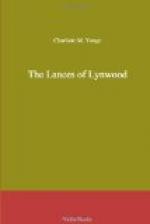“No witness beyond your own train, Sir Eustace?” said Clarenham.
“None,” said Eustace, “excepting one whose word even you will scarcely dare to dispute, Sir Bertrand du Guesclin.”
“I dispute no man’s word, Sir Eustace,” said Fulk; “I only say that until the claim which you allege be proved in the King’s Court, I am the lawful guardian of the lands and person of the heir of Lynwood. The Lord Chancellor Wykeham may weigh the credit to be attached to the witness of this highly respectable Esquire, or this long-eared man-at-arms, or may send beyond seas for the testimony of Du Guesclin: in the meantime, I assume my office. Come here, boy.”
“I will not come to you, Lord Fulk,” said Arthur; “or when I do, it shall be sword in hand to ask for an account for the tears you have made my sweet mother shed.”
“Bred up in the same folly!” said Fulk. “Once more, Sir Eustace, will you yield him to me, or must I use force?”
“I have vowed before his mother’s corpse to shield him from you,” returned Eustace.
“Think of the consequences, Sir Eustace,” said Sir Philip Ashton, coming up to him. “Remember the unrepealed grant to the Clarenhams. The Lynwood manor may be at any moment resumed, to which, failing your nephew, you are heir. You will ruin him and yourself.”
“It is his person, not his lands, that I am bound to guard,” said Eustace. “Let him do his worst; my nephew had better be a landless man, than one such as Fulk would make him.”
“Think,” continued Sir Philip, “of the disadvantages to your cause of provoking a fray at such a time. Hold your hand, and yield the boy, at least till the cause come before the Chancellor.”
“Never,” said Eustace. “His parents have trusted him to me, and I will fulfil my promise. The scandal of the fray be on him who occasions it.”
“Recollect, my Lord,” said Ashton, turning to Fulk, “that this may be misrepresented. These young warriors are hot and fiery, and this young Knight, they say, has succeeded to all his brother’s favour with the Prince.”
“I will not be bearded by a boy,” returned Clarenham, thrusting him aside. “Hark you, Sir Eustace. You have been raised to a height which has turned your head, your eyes have been dazzled by the gilding of your spurs, and you have fancied yourself a man; but in your own county and your own family, airs are not to be borne. We rate you at what you are worth, and are not to be imposed on by idle tales which the boastful young men of the Prince’s court frame of each other. Give up these pretensions, depart in peace to your fellows at Bordeaux, and we will forget your insolent interference.”
“Never, while I live,” replied Eustace. “Vassals of Lynwood, guard your young Lord.”
“Vassals of Lynwood,” said Fulk, will you see your young Lord carried off to perish in some unknown region, and yourselves left a prey to an adventurer and freebooter?”




